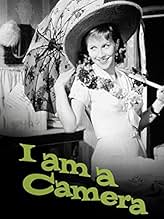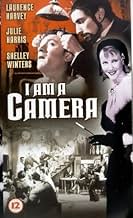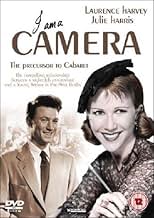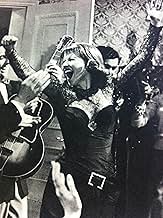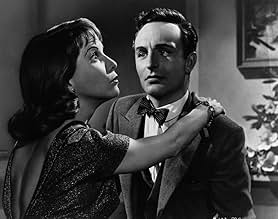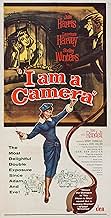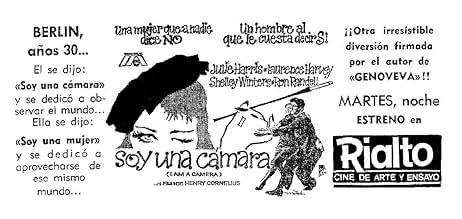VALUTAZIONE IMDb
6,3/10
668
LA TUA VALUTAZIONE
Aggiungi una trama nella tua linguaIn Weimar-era Berlin, an aspiring writer strikes up a friendship with a vivacious, penniless singer.In Weimar-era Berlin, an aspiring writer strikes up a friendship with a vivacious, penniless singer.In Weimar-era Berlin, an aspiring writer strikes up a friendship with a vivacious, penniless singer.
- Nominato ai 1 BAFTA Award
- 1 candidatura in totale
William Adams
- Old Doctor
- (non citato nei titoli originali)
Ian Ainsley
- Minor Role
- (non citato nei titoli originali)
Charles Andre
- Waiter
- (non citato nei titoli originali)
Julia Arnall
- Model
- (non citato nei titoli originali)
Jack Arrow
- Troika Doorman
- (non citato nei titoli originali)
Trama
Lo sapevi?
- QuizDespite being far less salacious than the 1951 stage play on which it was based, this film adaptation received a "Condemned" rating from the Legion of Decency, a Roman Catholic organization that passed moral judgments on films between 1933 and 1965. This rating was also given to Psyco (1960), A qualcuno piace caldo (1959) and Fino all'ultimo respiro (1960).
- BlooperWhilst most of the film is a flashback set in the early 1930s, all the costumes and hairstyles worn are straight out of the early 1950s.
- Citazioni
Christopher Isherwood: [to Sally] Any mess you get into, you try and get out of by using your extremely inadequate sex appeal.
- Curiosità sui creditiIn opening credits, Shelley Winters is misspelled "Shelly".
- ConnessioniFeatured in Omnibus: Christopher Isherwood: A Born Foreigner (1969)
- Colonne sonoreI Saw Him in a Café in Berlin
(uncredited)
Music by Ralph Maria Siegel
English lyrics by Paul Dehn
Sung by Liselotte Malkowsky
[Sally (Julie Harris) sings the song in her club act]
Recensione in evidenza
This film was inexplicably made in England, and though there is some staginess - noticably in the yelling of some of the actors - director Henry Cornelius provides some clever imagery eg the decadence of the Berlin nightclub by a piglet and two smashing beerglasses, and Christopher standing at a window in the past bringing out us out of the narrative flashback. It also features a remarkable hotel party setpiece.
The infamous role of Sally Bowles is written as a pretentious innocent, and the knowledge that Isherwood was gay feeds into the notion of Sally as a coded drag queen, or at least, an effeminate gay man. The screenplay is full of gay subtext eg Christopher's narcissism demonstrated in his lotions and weights and boufant hairstyle, Sally's descriptions of male musculature, the repeated use of sausages, Sally telling Christopher he doesn't "understand" women, his describing her sex appeal as "inadequate", the rectal thermometer, his massage, his confession that he is "not the marrying type", and fear of being "embroiled" with her. The major difference between this treatment and that of Bob Fosse's Cabaret is the Clive Mortimer character, who here is heterosexual, but would be later turned into the bisexual Max.
Julie Harris performed the role of Sally Bowles on Broadway, and one's opinion of her performance cannot help but be influenced by Liza Minnelli (as is one's opinion of the film as a piece). Harris works against her basic miscasting (she doesn't even use an English accent when we are told Sally is English) because Sally is such an artificial creation. She is like an Actors Studio version of a junior Auntie Mame, and even when her antics become tiresome, she is still far more likeable than Laurence Harvey's starched and basically asexual Christopher. Harris may not have Minnelli's street urchin vulnerability, but she has some inspired moments - posing in front of a mirror wearing a mink coat, her drunken giggling, looking behind a silk scarf, or licking milk with a wild tongue.
The infamous role of Sally Bowles is written as a pretentious innocent, and the knowledge that Isherwood was gay feeds into the notion of Sally as a coded drag queen, or at least, an effeminate gay man. The screenplay is full of gay subtext eg Christopher's narcissism demonstrated in his lotions and weights and boufant hairstyle, Sally's descriptions of male musculature, the repeated use of sausages, Sally telling Christopher he doesn't "understand" women, his describing her sex appeal as "inadequate", the rectal thermometer, his massage, his confession that he is "not the marrying type", and fear of being "embroiled" with her. The major difference between this treatment and that of Bob Fosse's Cabaret is the Clive Mortimer character, who here is heterosexual, but would be later turned into the bisexual Max.
Julie Harris performed the role of Sally Bowles on Broadway, and one's opinion of her performance cannot help but be influenced by Liza Minnelli (as is one's opinion of the film as a piece). Harris works against her basic miscasting (she doesn't even use an English accent when we are told Sally is English) because Sally is such an artificial creation. She is like an Actors Studio version of a junior Auntie Mame, and even when her antics become tiresome, she is still far more likeable than Laurence Harvey's starched and basically asexual Christopher. Harris may not have Minnelli's street urchin vulnerability, but she has some inspired moments - posing in front of a mirror wearing a mink coat, her drunken giggling, looking behind a silk scarf, or licking milk with a wild tongue.
- petershelleyau
- 13 dic 2003
- Permalink
I più visti
Accedi per valutare e creare un elenco di titoli salvati per ottenere consigli personalizzati
- How long is I Am a Camera?Powered by Alexa
Dettagli
- Tempo di esecuzione1 ora 38 minuti
- Colore
- Proporzioni
- 1.37 : 1
Contribuisci a questa pagina
Suggerisci una modifica o aggiungi i contenuti mancanti

Divario superiore
By what name was La donna è un male necessario (1955) officially released in India in English?
Rispondi

